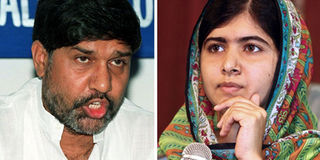Malala Yousafzai and Kailash Satyarthi win Nobel Peace Prize

Kailash Satyarthi (left), Indian anti-child labour activist and head of the South Asian Coalition Against Child Servitude, in New Delhi on June 18, 1999, and Pakistani education activist Malala Yousafzai in Abuja on July 14, 2014. Mr Satyarthi and Ms Yousafzai are the winners of the 2014 Nobel Peace Prize, the Nobel committee announced on October 10, 2014. AFP PHOTOS | RAVEENDRAN | WOLE EMMANUEL
OSLO
The Nobel Peace Prize went Friday to 17-year-old Pakistani Malala Yousafzai and India's Kailash Satyarthi for their work promoting children's rights.
The Norwegian Nobel Committee awarded the prize, saying that peaceful global development can only come about if children and the young are respected.
Malala is the youngest person to be awarded the globally prestigious annual prize.
"The Norwegian Nobel Committee has decided that the Nobel Peace Prize for 2014 is to be awarded to Kailash Satyarthi and Malala Yousafzai for their struggle against the suppression of children and young people and for the right of all children to education," the jury said.
Malala Yousafzai — who survived being shot in the head by the Taliban in 2012 — was recognised for fighting for years for the right of girls to education, showing by example that children can contribute to improving their own situations.
"This she has done under the most dangerous circumstances," the committee said.
"Through her heroic struggle she has become a leading spokesperson for girls' rights to education."
It also said that the prize recognised work by Satyarthi to head various forms of protests and demonstrations, all peaceful, focusing on the grave exploitation of children for financial gain.
"Children must go to school and not be financially exploited," the committee said.
"In conflict-ridden areas in particular, the violation of children leads to the continuation of violence from generation to generation."





